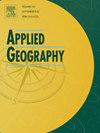Synergistic enhancement of watershed ecosystem services: A network approach
IF 5.4
2区 地球科学
Q1 GEOGRAPHY
引用次数: 0
Abstract
Understanding the interplay among water, food, and ecology is crucial for achieving synergistic enhancement of their interconnected benefits, and the ecosystem services (ESs) network is an effective approach to exploring such complex relationship. Many studies focused on ESs trade-offs and synergies related to water, food, and ecology, while few studies investigated the complex relationship among water, food, and ecology and corresponding synergistic enhancement pathways from a network perspective. Here, we focused on three key ESs: water purification, grain production, and biodiversity maintenance, and constructed an ESs network to identify the synergistic restoration areas based on the change of the trade-off degree and synergy degree within the network. The results showed that trade-offs dominated more than 93 % of ESs networks in sub-basins, with the trade-off degree around the Dongting Lake area being significantly higher than those in other areas. Additionally, 12.24 % and 35.54 % of the sub-basin area were identified as priority grain production restoration area and priority ecological restoration area, respectively, providing assistance for targeted ecological restoration efforts of regional coordination. This study revealed complex relationships of synergistic enhancement of water, food, and ecology from a network approach, supporting to realize synergistic management of water pollution, food shortage, and ecological degradation.
流域生态系统服务的协同增强:网络方法
了解水、食物和生态之间的相互作用对于实现它们相互关联利益的协同增强至关重要,生态系统服务(ESs)网络是探索这种复杂关系的有效途径。许多研究关注的是与水、食物和生态相关的ESs权衡和协同效应,而很少有研究从网络角度探讨水、食物和生态之间的复杂关系以及相应的协同增强途径。本文围绕水质净化、粮食生产和生物多样性维持这三个关键生态系统,构建生态系统网络,根据生态系统网络内部权衡度和协同度的变化来识别协同恢复区域。结果表明,流域内生态系统网络的权衡性占比超过93%,其中以洞庭湖为中心的权衡程度显著高于其他区域。其中,粮食生产优先恢复区域占12.24%,生态优先恢复区域占35.54%,为区域协调有针对性的生态恢复提供了支持。本研究从网络角度揭示了水、食物和生态协同增强的复杂关系,为实现水污染、食物短缺和生态退化的协同管理提供了支持。
本文章由计算机程序翻译,如有差异,请以英文原文为准。
求助全文
约1分钟内获得全文
求助全文
来源期刊

Applied Geography
GEOGRAPHY-
CiteScore
8.00
自引率
2.00%
发文量
134
期刊介绍:
Applied Geography is a journal devoted to the publication of research which utilizes geographic approaches (human, physical, nature-society and GIScience) to resolve human problems that have a spatial dimension. These problems may be related to the assessment, management and allocation of the world physical and/or human resources. The underlying rationale of the journal is that only through a clear understanding of the relevant societal, physical, and coupled natural-humans systems can we resolve such problems. Papers are invited on any theme involving the application of geographical theory and methodology in the resolution of human problems.
 求助内容:
求助内容: 应助结果提醒方式:
应助结果提醒方式:


